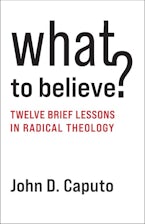
Hope in a Secular Age
Deconstruction, Negative Theology, and the Future of Faith
By: David Newheiser
184 Pages
- eBook
- ISBN: 9781108595100
- Published By: Cambridge University Press
- Published: January 2020
$80.00
David Newheiser’s first book, Hope in a Secular Age: Deconstruction, Negative Theology, and the Future of Faith, works to build a theology of hope that takes seriously the realities of disappointment, despair, and the temptation of complacency. In many ways, for a book about hope, Newheiser’s project is fairly pessimistic, or at least he isn’t sanguine. The opening line hints at this: “I wrote this book because I believe it is hard to hope” (1). However, the author holds that hope is exactly what is needed to propel life forwards. In his own words, “because complacency and despair exert a constant pull, hoping is hard, but it is also indispensable” (3). Newheiser defines hope as “decision added to desire” (9), which enables us to move beyond the temptation of complacency and despair towards a better future.
Newheiser’s primary influences in the book, Dionysius the Areopagite and Jacques Derrida, are situated in the premodern and the postmodern epochs, respectively. Through an intriguing and refreshing reading of their works, Newheiser contends that “it is possible to keep faith in the dark through the discipline of hope.” (11) In the first chapter, the author spends considerable time arguing that Derrida’s concept of deconstruction is an ethical position of uncertainty that “nurtures an affirmation without assurance,” and therefore models hope as a discipline (37). Chapter 2 contends that Christian theology operates with a similar tension between uncertainty and affirmation, as demonstrated by the Areopagite.
In chapter 3, Newheiser develops his idea of the character of hope. Here, he argues that instead of viewing hope as a fantasy to be avoided, hope may be open to negativity, for hope requires that we acknowledge the distance between our desires and their realization. The author believes that Dionysius and Derrida both affirm a hope of the same kind, though with different content. They both “recognize that hope is directed toward the future, nourished by the past, and sustained in the present” (77). At the end of this chapter, Newheiser states that “through the discipline of hope, it is possible to admit that even the most extensive rationality is inadequate to protect against the fragility of human existence” (84). Hope allows one to endure through uncertainty. Though Newheiser offers compelling readings of both Derrida and Dionysius, as well as other interlocutors such as Albert Camus or Baruch Spinoza, it is unclear exactly how hope is separate from rationality, or at least in what ways hope is in some way a supplement to, or a possible corrective of, extensive rationality. It seems that hope as a discipline, or a virtue, can be inculcated without some sort of rational process, which does not receive much attention in his argument. While I am inclined to agree with his description of hope as incorporating a self-critical negativity, it would have been good to see further development of this distinction.
Through chapters 4 and 5, where Newheiser discusses the idea of the secular age at length, he pays less attention to Charles Taylor or Harvey Cox (perhaps more “obvious” candidates) and instead focuses on Mark Lilla, Jacques Derrida, and Thomas Hobbes. Newheiser argues that the total exclusion of religion from public life “is both impossible and unnecessary” (109), and that the account of hope that he has been developing has political implications, which are addressed through chapter 6. Engaging the work of Giorgio Agamben, Newheiser argues that a Dionysian vision of uncertainty affirms imperfect structures in such a way that allows for the possibility of transformation. Hope, providing an avenue towards critique and self-critique, opens new political possibilities for our time. As he notes at the end of the book, “apophasis reminds us that the beyond can be captured neither in a discursive description, nor in a political system, nor in ritual practice,” but “hope does not preclude such efforts” (156). Hope requires that we endure despite uncertainty.
Stylistically, the book presents complex arguments in ways that I believe a broad audience will be able to follow. Newheiser sometimes relies too much on “in this chapter I will . . .” and “I have argued . . .” formulas, which feels unnecessary, if for no other reason than he is already a skilled enough writer to present his arguments in a flow that is easy to follow. I wish the author would trust his readers more than he appears to. In the end, this book is valuable for anyone who is interested in the fields of political theology and negative theology, as well as for those with interest in ethics, secularization theory, and theologies of hope. Hope in a Secular Age skillfully draws from an eclectic and rich well of sources spanning across time and philosophical commitments, envisioning a new way forward through uncertain times.
Regan Hardeman is a PhD Student at the Boston University School of Theology.
Regan Hardeman
Date Of Review:May 17, 2022
David Newheiser, Australian Catholic University, Melbourne











